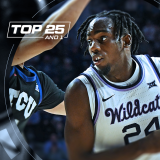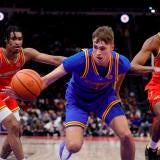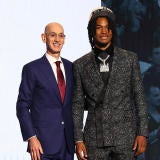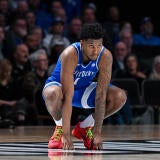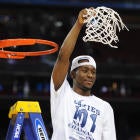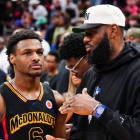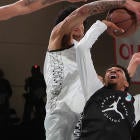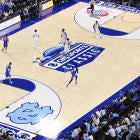On Sept. 26, the FBI rolled a stick of dynamite under college basketball's feet. The federal government unveiled its scoop, two years in the making, that unsheathed widespread fraud and bribery in recruiting. Ten men, including four assistant coaches from power conferences, were put in handcuffs. The news struck paranoia into an untold number of programs within the sport, sending who-knows-how-many coaches, handlers, would-be agents/runners and others scrambling to get a grasp on what was ahead, what could be next.
But what would be next? We still don't know.
Today -- exactly four months since the FBI and Department of Justice's boastful press conference in lower Manhattan -- the question so many in college basketball are still asking of others: What have you heard?
If you've found yourself curious as to what's happened with the FBI's groundbreaking college basketball probe, there are a lot of coaches -- powerful and influential coaches -- who are just like you. The most unexpected thing about the story that rocked the sport's offseason is how little has happened since September. No one's heard much of anything because no one's saying much of anything. That's the scare of a federal investigation. That's the power of the FBI.
The story that was supposed to loom over college basketball this season has instead dissipated to the background. It hasn't been a front-page story, hasn't even been a distraction -- more of an occasional wonderment. If this is what the FBI wanted, it certainly didn't indicate as much back in September at that presser with its "call us, don't make us call you" exhortation to potential hoops-affiliated lawbreakers still on the dodge.
William F. Sweeney Jr., who spoke on Sept. 26 as the assistant director in charge of the New York's FBI office, taunted wrongdoers with a line that was repeated in print, on television and radio in the ensuing week: "We have your playbook."
The Los Angeles Times, citing anonymous sources working the case, reported in October that more charges against others were expected later that month. That never happened. Now coaches, media, NCAA staffers and employees at college institutions are ever-curious and increasingly in the dark. The FBI's got everyone standing, waiting, wondering. Maybe that's just what it's going for.
As one influential person in the sport put forth to me on Thursday, "Does 'nothing' mean the bomb is coming, or does it mean nothing is coming?" People throughout the college basketball world often request anonymity when talking about the case because, well, it's the FBI.
The stall hasn't stopped theories from being floated. In speaking with multiple coaches, agents, administrators and others in the sport over the past few weeks, hypotheses range from the FBI waiting until March -- ripe for NCAA Tournament time -- to make its next big splash, to potentially waiting for the live recruiting season to rev up in April. Why then? To bust more coaches when they're on the road. There are those who believe that the FBI was bluffing. If more was coming, we'd have heard it by now.
What is known: The men who have been charged are expected to head to court in the coming month(s). This FBI endeavor isn't one big case, but rather three separate ones with varying charges because different players in the scheme have been levied with different crimes. Within each case, all defendants will have their own chance at clearing their name, of course.
It took nearly four months, but all four coaches named in the federal complaint have now been fired. On Thursday, the LA Times broke the news that USC formally fired former assistant coach Tony Bland last week. Quietly, earlier this month, Arizona did the same with former assistant Book Richardson, who allegedly took $20,000 in cash across multiple meetings while recruiting for the Wildcats. (Jahvon Quinerly, a five-star prospect in the class of 2018, was discovered to be the recruit connected to Richardson's wrongdoing. He de-committed from Arizona on Oct. 19.)
Richardson could still seek legal retribution against the University of Arizona. According to his attorney, he has until Feb. 15 to file a suit that would likely allege wrongful termination. (Coincidentally, Feb. 15 is also the date of Richardson's pre-trial hearing in New York.) Richardson has been charged with conspiracy to commit bribery, wire fraud, travel act conspiracy, solicitation of bribes and gratuities by an agent of a federally funded organization, and conspiracy to commit honest services wire fraud.
Those charges are similar, if not identical, to what Bland, Auburn's Chuck Person and Oklahoma State's Lamont Evans were hit with. But each coach's situation is different because the recruitments involved operated with varying money amounts and different tactics.
For example, compare Richardson's situation to Person, who is alleged to have received $91,500 in a 10-month span from cooperating witness Marty Blazer. Person has been specifically targeted by the FBI not only for his nefarious influence in recruiting players to Auburn, but also for pocketing tens of thousands of dollars in cash bribes and withholding money and information to the families of recruits.
Auburn coach Bruce Pearl told CBS Sports in December that, despite earlier reports indicating otherwise, he is cooperating with his university's independent investigation into the matter. The Tigers have become one of the wild stories in college hoops this season. Pearl has gone from being a target for pre-season termination to landing in the mix for National Coach of the Year. Auburn, 18-2, is off to its best start in program history, ranked in the top 25 and on top in the SEC.
Elsewhere, Oklahoma State sat senior Jeffrey Carroll for the first three games of the season but he has played every game since. That's not the case for USC sophomore De'Anthony Melton, who was declared ineligible for the season by the school. Former Louisville player Brian Bowen, whose recruitment led to the ouster of Hall of Famer Rick Pitino, was cleared by the FBI but not by Louisville. He transferred and is now enrolled at South Carolina, practicing with the team. Gamecocks coach Frank Martin explained in an exclusive interview with CBS Sports earlier this month why he's confident Bowen will ultimately be cleared by the NCAA.
So while there have been bit pieces and storylines affiliated with the FBI case, there hasn't been any new information from the the Bureau itself. There was, however, another piece of news that came out on Jan. 4, and its ripple effects are still to be determined. On Sept. 26 at that press conference in lower Manhattan, U.S. Attorney Joon Kim led the charge. He was the star of that show.
But Kim was acting, albeit quite efficiently, in an interim role after having taken over as acting U.S. Attorney for Preet Bharara, who was fired by Donald Trump in March 2017. Kim was removed from his post on Jan. 4 and replaced by Geoffrey Berman. How aggressively, and rapidly, Berman chooses to pursue the case that Kim made a splash with remains to be seen. What if the case lost steam after it hit Berman's desk? (For perspective, the college basketball bribery case -- though a huge news story -- clearly does not register as the most significant investigation of Kim's tenure.)
As we turn to February and enter the thick of the conference season, college basketball's headlines aren't dominated by arrests, court hearings, anonymous sources or the FBI. It's Trae Young, Marvin Bagley III, Villanova and Zion Williamson owning the news cycle.
But just because the FBI gave college basketball its season back doesn't mean it can't or won't stride in once more and flip the sport on its side. So, we wait on a federal selection committee of sorts. We're only five weeks from March, that time of year for brackets -- but also another term synonymous with the sport: busted.




